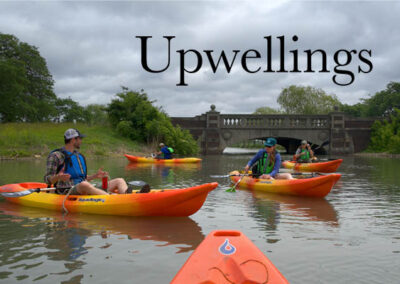FOR IMMEDIATE RELEASE
Contact:
- Rhett Register, Michigan Sea Grant Communications Lead, (734) 647-0767, [email protected]
- Cindy Hudson, Michigan Sea Grant Extension Communications Manager, (517) 353-9723, [email protected]
CLEVELAND – The Great Lakes Sea Grant Network recently honored the work of the Michigan Sea Grant team with several awards during its semi-annual conference in Cleveland, Ohio. The network connects regional state Sea Grant programs and assists in coordinated efforts to solve problems and manage Great Lakes resources.

Michigan Sea Grant Extension Educator Mary Bohling receives the Great Lakes Sea Grant Network’s mid-career award.
Michigan Sea Grant Extension Educator Mary Bohling of Detroit received a mid-career award noting her excellent work during her 11-year career. Bohling serves the urban Detroit area and works with diverse populations, coastal communities, nonprofit groups, businesses, researchers and politicians applying science-based knowledge to address Great Lakes issues.
Bohling actively assists nonprofit partners in the preparation and reporting of grants, including numerous successful Great Lakes Restoration Initiative grants that have totaled nearly $30 million. Bohling is always looking for creative and interesting ways to get urban youth out on the water or bike trails, including helping to bring the Wilderness Inquiry Canoemobile to Detroit several times.
“Mary Bohling is an excellent extension educator who has strong interaction in her communities and with her colleagues. She is creative and has made — and continues to make — outstanding contributions to Michigan Sea Grant and our state,” said Heather Triezenberg, Michigan Sea Grant Extension program leader.

Michigan Sea Grant Extension Educator Brandon Schroeder receives the Great Lakes Sea Grant Network’s Distinguished Service Award.
Extension Educator Brandon Schroeder of Alpena was honored with a Distinguished Service Award. Schroeder has been with Michigan Sea Grant for 13 years and serves coastal counties, encompassing 230 miles of Lake Huron shoreline in Michigan’s northeastern Lower Peninsula. Brandon’s programming focuses on the changing Lake Huron fishery, coastal tourism and business development, and youth engagement in coastal community development and stewardship.
Schroeder’s leadership and involvement in many place-based education opportunities, 4-H Great Lakes and Natural Resources Camp, Center for Great Lakes Literacy, and fisheries workshops are just some of the ways he shares his expertise with stakeholders.
“His enthusiasm for his work, combined with a natural curiosity, broad knowledge base, and engaging approach to his work, combine in a way that is unique and extremely effective,” said co-worker Steve Stewart, a senior extension educator.
In addition to these individual awards, Michigan Sea Grant received the Network’s Great Lakes Outreach Programming Award for its Sustainable Small Harbors project.
The Sustainable Small Harbors project, funded by Michigan Sea Grant and a host of partners, aims to assist coastal communities in their planning efforts. The project has enabled six coastal communities with public harbors to do in-depth self-assessments, uncovering strengths and weaknesses related to their waterfront assets and to collaboratively envision their future.
The project has come at a time when harbor towns can capitalize on rebounding tourist dollars and a recovering state economy to make needed waterfront upgrades and add amenities that will increase their appeal to visitors. Team members customized and created highly interactive, public input-driven workshops, or charrettes — typically valued at tens of thousands of dollars — at no direct cost to the six case-study communities involved. The project brought together community decision-makers, harbor managers, infrastructure planners, boaters, business owners and others to come up with meaningful pathways for moving their communities forward.
“The economic and environmental health of small towns along Michigan’s coast is essential to strengthening the state’s economy and environment,” said Jim Diana, Michigan Sea Grant director. “If Michigan thrives, then the Great Lakes region as a whole benefits – and that’s why this program has been so important.”

Sustainable Small Harbor program team members Todd Marsee (left) and Mark Breederland accept the Great Lakes Sea Grant Network’s Outreach Programming Award on behalf of Michigan Sea Grant.
Team members for the Sustainable Small Harbors project from Michigan Sea Grant included Mark Breederland, Catherine Riseng, Amy Samples and Todd Marsee. Don Carpenter from Lawrence Technological University was principal investigator. Other partners included:
Michigan State University Extension; Michigan Department of Environmental Quality’s Office of the Great Lakes; Michigan Department of Natural Resources Waterways Program; Michigan Development Corporation; Michigan State Housing Development Authority; Environmental Consulting and Technology, LLC; Veritas Environmental Consulting, LLC; David L. Knight, LLC; Edgewater Resources, LLC; Richard Neumann, architect; Constance Bodurow, designer.
Michigan Sea Grant helps to foster economic growth and protect Michigan’s coastal, Great Lakes resources through education, research and outreach. A collaborative effort of the University of Michigan and Michigan State University and its MSU Extension, Michigan Sea Grant is part of the NOAA-National Sea Grant network of 33 university-based programs.


